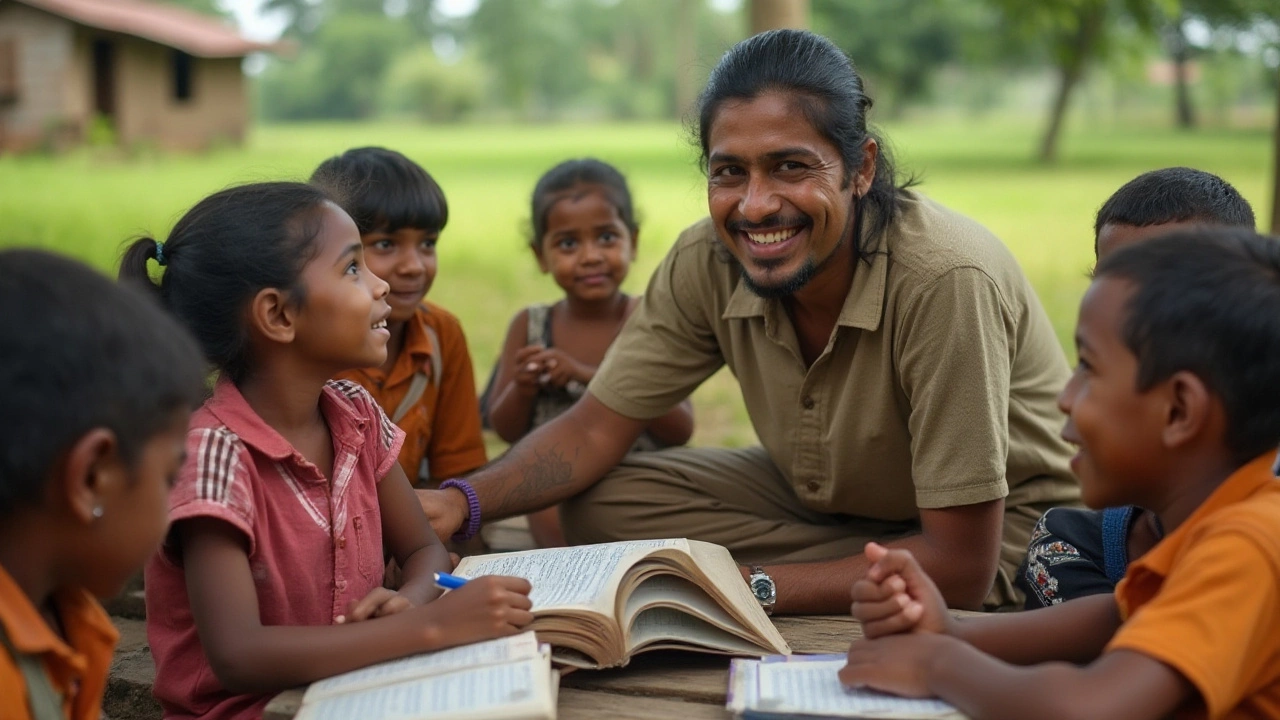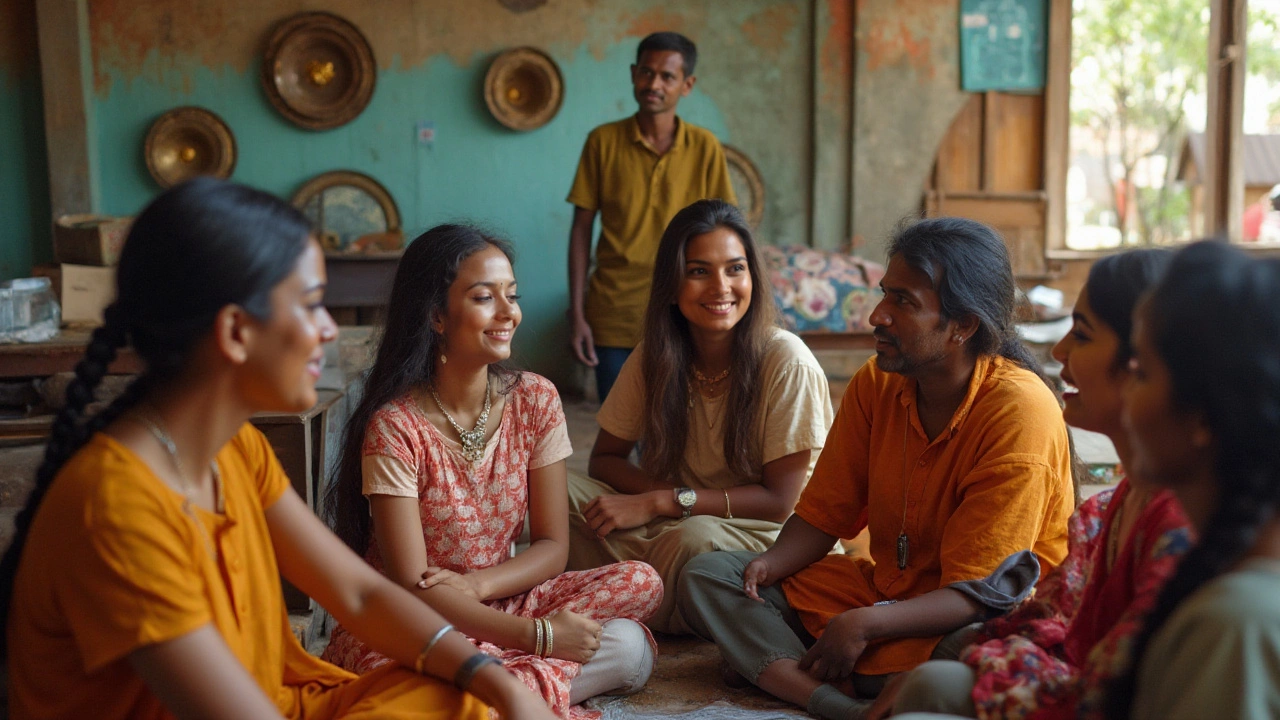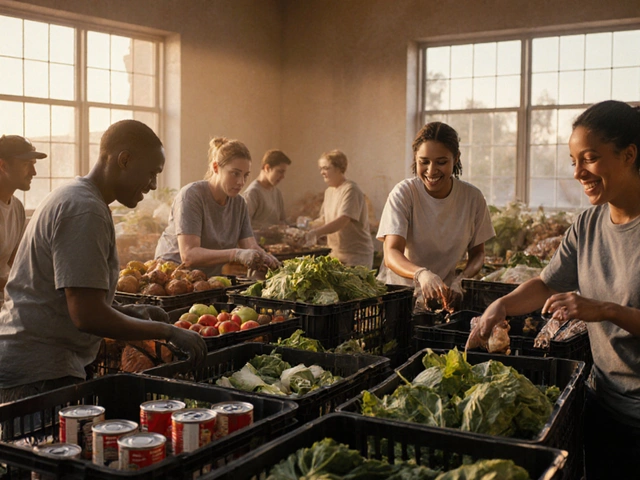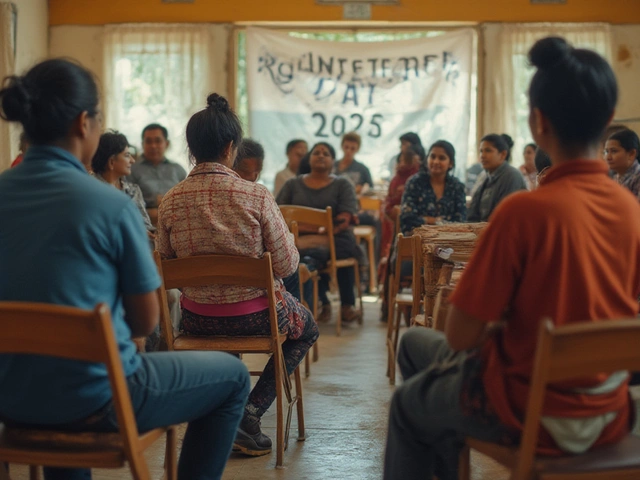In a world where the needs are great, volunteers are the backbone of positive community change. Becoming an ideal volunteer isn't just about showing up; it's about bringing the right mindset and skills to the table. Understanding what makes a volunteer truly effective can open doors to numerous opportunities where your contributions can make a difference.
An ideal volunteer is much more than just a willing participant. They embody a unique mix of qualities that prepare them to tackle challenges and create meaningful change. This article delves into these qualities and offers insights into aligning your strengths with volunteer opportunities that not only benefit others but enrich your own life as well.
- Understanding the Essence of Volunteering
- Key Traits of an Ideal Volunteer
- Matching Skills with Volunteer Opportunities
- Developing a Volunteer's Mindset
- Impact of Volunteers in Society
- How to Start Your Volunteering Journey
Understanding the Essence of Volunteering
The essence of volunteering extends far beyond merely fulfilling a duty; it is about connecting with others, building communities, and sharing talents and skills in ways that forge lasting change. At its core, volunteering is about the spirit of giving, and the notion that everyone has something invaluable to offer, no matter their background or resources. When individuals engage in volunteer work, they aren't just providing services; they are actively investing in the well-being and development of their communities. This commitment often inspires those they serve, creating a ripple effect of goodwill and cooperation that benefits all parties involved.
One might be surprised to learn that volunteering can also be traced back to ancient cultures, where communal help and cooperation were paramount to survival. In today's fast-paced world, these principles remain just as relevant. Not only do volunteers contribute to various causes, but they also gain personal fulfillment and growth. This is one reason why many people seek out volunteer opportunities that align with their passions and abilities. The sense of purpose derived from volunteering can significantly enhance one's life, providing a newfound perspective and a deeper understanding of the world.
According to a survey conducted by the Corporation for National and Community Service, around 77.4 million Americans volunteered in one year, contributing an estimated 6.9 billion hours with a value of approximately $167 billion. This data underscores the impact of volunteering on society, revealing how the collective efforts of individuals can lead to meaningful change and significant social benefits. Whether through environmental conservation, literacy programs, or health initiatives, volunteers serve as catalysts for progress and innovation in numerous domains.
"The best way to find yourself is to lose yourself in the service of others," Mahatma Gandhi famously said. This quote captures the transformative power of volunteering, illustrating how selflessly giving back to society can ultimately lead to personal discovery and growth. Volunteers, by virtue of their willingness to dedicate time and effort to various causes, experience a unique journey of self-awareness and development.
Individuals who engage in volunteer work often find that they acquire new skills, expand their social networks, and even enhance their career prospects. The act of stepping out of one's comfort zone to help others fosters resilience and adaptability, qualities that are valuable both in personal and professional settings. Many organizations actively seek individuals with volunteer experience, recognizing the soft skills and dedication that such endeavors cultivate. In this way, volunteering extends its benefits to both society and the volunteers themselves.
Key Traits of an Ideal Volunteer
When it comes to defining the essential qualities of an ideal volunteer, many people instantly think of the obvious—kindness and a willingness to lend a hand. Yet, the picture is much richer and more nuanced. To truly understand what sets apart a good volunteer from a great one, it helps to dive deeper into the attributes that contribute to effective and meaningful service. A critical trait is empathy—an ability to genuinely understand and share the feelings of another. Empathy doesn't only make interactions more human but also connects volunteers with the cause on a deeper level, ensuring a passionate and committed contribution.
Another indispensable trait is dependability. Organizations rely heavily on volunteers to fulfill essential roles, and without a sense of responsibility, even the most enthusiastic volunteer can disrupt carefully arranged plans. This means not just showing up to scheduled commitments but being proactive in communication if things need to change. It is crucial in maintaining trust and ensuring operations run smoothly. This conscientiousness pairs with adaptability—a volunteer might find their deployments change at a moment's notice, requiring them to think on their feet and adjust swiftly to new circumstances.
In the modern volunteer landscape, having specific skills or a willingness to learn new ones can drastically increase a volunteer's effectiveness. From technical expertise such as first aid or IT proficiency to soft skills like leadership and communication, possessing these capabilities can broaden the horizons where a volunteer can contribute. As the famous activist Dorothy Day once expressed,
"People say, what is the sense of our small effort? They cannot see that we must lay one brick at a time, take one step at a time."This perspective neatly encapsulates the importance of bringing any skill to the task at hand, no matter how modest it may seem.
Patience and resilience are also pivotal traits. Volunteering often comes with challenges, whether it’s working under tough conditions or navigating bureaucratic hurdles. An ideal volunteer remains calm in adversity, with patience fueling their persistence and dedication. It's about enduring and thriving, a mindset that correlates directly with achieving long-standing objectives. A report by Volunteer Canada highlighted how volunteers who exhibited resilience had higher satisfaction rates and significantly contributed to organizational stability. Resilience allows volunteers to cope effectively with setbacks, ensuring they can continue to serve in a sustainable manner.
Lastly, possessing a sense of humor may not seem as critical on the surface, but it is an underrated trait that can uplift spirits, create a positive atmosphere, and foster strong bonds among team members. Humor can bridge cultural and language gaps, making it easier to relate and share moments with those you’re helping. It’s a reminder that while the work may be serious, taking yourself lightly can often bring warmth and connection in challenging environments.

Matching Skills with Volunteer Opportunities
Discovering the right volunteer opportunities that align with your personal skills can be a transformative experience, both for you and the community you aim to serve. This isn't just about filling a role; it's about finding a perfect fit where your abilities shine while serving a cause that inspires you. To start, conduct a self-inventory of your skills. Are you a natural leader, or do you work best behind the scenes? Do you have technical skills like IT or design, or perhaps a knack for organizing events? Identifying these can substantially benefit your volunteer search.
Each community has diverse needs that require specific skills which volunteers can provide. For example, a community center might need someone with financial skills to manage books, while an animal shelter may need individuals adept at handling animals and promoting adoption events. Health clinics often look for volunteers with medical expertise or those willing to perform administrative tasks. Understanding where your talents can fill a gap is crucial. The Peace Corps, a well-known volunteer organization, emphasizes identifying skills that match their programs, ensuring that volunteers contribute effectively.
Volunteer skills like strong communication, patience, and problem-solving can be a boon in various situations. For instance, mentoring or tutoring effortlessly blends with these skills. As you search for roles, look beyond the job title; delve into the roles’ descriptions and requirements. Moving past the surface helps align your passions and strengths, nurturing both personal growth and impactful service. This approach aligns with the findings of Greg Baldwin, the president of VolunteerMatch, who once said,
"The best way to find yourself is to lose yourself in the service of others."
The internet offers numerous platforms where skills can be matched with volunteer opportunities. Websites like Idealist or VolunteerMatch allow you to input your volunteer traits and find matching positions. On these platforms, understanding your motivations and the amount of time you are willing to commit also plays a crucial role in finding suitable opportunities. This attention to detail not only aids you in discovering the right fit but also enhances satisfaction in the tasks you choose to undertake.
For practical steps, start by listing your core competencies alongside your interests. Create a simple table that can serve as a springboard for your volunteering journey. Consider this format:
| Skill | Potential Opportunity |
|---|---|
| Teaching/Tutoring | After-school programs, literacy classes |
| Event Planning | Fundraisers, community festivals |
| Technical Expertise | Website development, tech support |
Developing a Volunteer's Mindset
To truly embrace a role in volunteering, one must cultivate a mindset that resonates with the essence of service. At its core, developing a volunteer's mindset is about fostering empathy, reliability, and a passion to contribute selflessly. It starts with understanding that volunteering is not just a task but a commitment to making a difference, no matter how big or small the impact. This mindset begins to form by engaging deeply with the community and the cause you pledge to support. Recognizing that each act of service can ripple through a community, sparking change and hope, helps fuel a sustained dedication to volunteering adventures. Many volunteers often discover that through giving, they not only help others but also enrich their own lives, fostering a sense of personal fulfillment and growth.
One of the critical elements in cultivating this mindset is the ability to see from perspectives beyond one's own. Empathy is not just about understanding another person's position but stepping into their shoes and feeling their struggles and triumphs. This trait often distinguishes an ideal volunteer from others. According to a study conducted by the Corporation for National and Community Service, volunteers who regularly practice empathy tend to have more meaningful and impactful volunteer experiences. Moreover, by engaging with diverse communities and issues, volunteers can enrich their understanding of the world, which can lead to more informed and compassionate actions in all areas of life.
Tools to Cultivate a Volunteer's Mindset
Practical approaches can help in nurturing the mindset necessary for impactful volunteering. One might start by setting personal intentions before participating in volunteer activities, reflecting on the reasons behind their desire to serve. Volunteers should also seek feedback from peers and coordinators to continuously improve their approach and efficacy. Embracing patience and persistence is critical, especially when outcomes are not immediately visible. It’s vital to recognize that enduring change often takes time and continuous efforts from multiple parties. The process of becoming a great volunteer involves ongoing learning and adaptation, applying lessons from each experience to future endeavors.Another significant facet of a volunteer mindset involves learning from failure without losing enthusiasm. Volunteering is ripe with challenges, and obstacles can arise that test resolve. Volunteers are encouraged to approach these tests with creativity and patience. A famous quote from Winston Churchill beautifully encapsulates this approach:
"Success is not final, failure is not fatal: It is the courage to continue that counts."This resilience ensures that volunteers stay committed, finding new paths to achieve goals rather than being deterred by temporary setbacks. Strong perseverance combined with compassion can distinguish a volunteer who leaves lasting legacies within the communities they serve.
Ultimately, nurturing a volunteer's mindset transcends mere intention. It’s about commitment to ethical service, personal growth, and societal progress, carried out with humility and integrity. By continually aligning their actions with the greater good, volunteers contribute to creating a more empathetic and interconnected world, which is, after all, the true spirit of volunteering.

Impact of Volunteers in Society
Volunteers have a transformative effect on communities, driving social progress and fostering connections among diverse groups. The contributions made by volunteers are invaluable, yet often go unnoticed, even though they are deeply woven into the fabric of our social systems. Each volunteer hour can significantly enhance the quality of life within a community, offering hands-on support that often can't be matched by governmental or private sectors alone. Notably, volunteering promotes cultural exchange and understanding, helping to break down barriers and build more inclusive societies. This communal spirit results in not only improved communal resources but also boosts morale and connectedness among residents, creating a stronger community bond.
Financially, the impact of volunteering is astounding. According to a report by Independent Sector, the estimated value of a volunteer hour in the United States was $29.95 in 2023. This figure signifies the economic value of time contributed voluntarily, yet it barely scratches the surface of the emotional and social benefits volunteers bring. Such contributions support societal pillars such as education, healthcare, and nonprofit organizations, allowing them to stretch limited resources further. Volunteer opportunities span across sectors including environmental conservation, education enhancement, and public health, offering specialized skills where they are needed most. Volunteers often bring fresh perspectives and innovative ideas to their roles, revitalizing efforts that might otherwise stagnate under traditional approaches.
One inspiring aspect of volunteerism is its ripple effect on personal wellbeing. Numerous studies have shown that those who volunteer experience lower levels of depression and anxiety, along with increased longevity and fulfillment. This bidirectional benefit enriches both the volunteers and the communities they serve. When individuals engage in altruistic activities, they often gain a profound sense of purpose and satisfaction, which transcends into other areas of life, creating a more engaged and harmonious society. Howard Schultz, former CEO of Starbucks, once expressed, "When you're surrounded by people who share a passionate commitment around a common purpose, anything is possible." This quote underscores the synergy and power that group volunteerism mobilizes for setting and achieving impactful social goals.
Moreover, volunteering often acts as a bridge for skill development and social connections. Individuals involved in community activities frequently acquire new skills, broaden their social networks, and gain valuable experiences that can lead to job opportunities or career shifts. It serves as a practical educational platform, allowing individuals to test new waters in a safe and encouraging environment. This flexibility allows volunteers to shape their roles as they align personal growth with community needs, thus maintaining high levels of motivation and endurance. Such involvement is crucial for communities, wherein localized efforts can address areas neglected by larger administrative bodies.
From a global perspective, volunteers are essential in addressing urgent global challenges such as climate change, humanitarian relief, and educational inequity. Organizations such as the United Nations Volunteers (UNV) program mobilize thousands of volunteers annually to support peacekeeping and development initiatives worldwide. Volunteerism helps communities reach sustainable development goals (SDGs) by leveraging human capital to drive innovation and adaptability. By working together, individuals of different backgrounds unite under a shared mission, contributing to solutions that are culturally sensitive and locally relevant. Thus, volunteer traits like adaptability, empathy, and collaborative spirit are not only beneficial but essential in tackling today's multifaceted global issues.
How to Start Your Volunteering Journey
Embarking on a volunteering journey can be an incredibly rewarding experience, and it all begins with taking that very first step. Many people find themselves eager to volunteer but unsure of how and where to start. The first essential step is self-reflection. Take some time to consider what causes matter to you most. Is it environmental conservation, helping the elderly, or supporting underprivileged youth? Your passion for a specific cause will drive your commitment and enhance the experience for both you and those you aim to help.
Once you have clarity on the causes you feel strongly about, it’s time to research opportunities. The internet is a treasure trove of volunteer opportunities. Many organizations have user-friendly websites showcasing available positions, the requirements needed, and the impact they aim to create. Websites like VolunteerMatch and Idealist can be invaluable resources for finding local or even international opportunities tailored to your interests and skills. Subscribe to community newsletters or connect with local nonprofits to stay updated on upcoming events and needs.
Mentorship can play a fundamental role as you begin your volunteering adventure. Experienced volunteers can provide insights and guidance, which can be particularly beneficial in specialized fields like disaster relief or healthcare. Don't hesitate to reach out to these individuals, ask questions, and learn from their experiences. As Theodore Roosevelt once wisely noted,
"The best thing you can do is the right thing, the next best thing is the wrong thing, and the worst thing you can do is nothing."Motivation to volunteer is driven by the results they witness, but understanding the intricacies of a specific field can empower new volunteers to make informed and impactful contributions from the start.
Building essential skills relevant to volunteering tasks is another crucial factor. For instance, if you decide to offer your services in a non-profit organization managing communications, having a background in social media or marketing automation can significantly enhance your effectiveness. Consider enrolling in workshops or online courses to hone skills valuable to your roles, such as project management, first aid, or language courses for international volunteering. Such efforts not only equip you with the tools for effective volunteering but also expand your professional and personal horizons.
Keep your mind open to diverse experiences. Different volunteer opportunities vary in demands - from administrative duties to hands-on roles. Trying varied roles not only helps in understanding your strengths and preferences, but it also makes you a versatile and well-rounded volunteer. While some individuals are naturally drawn towards organizing community events, others might find fulfillment working behind the scenes in fundraising or policy formulation.
Finally, prepare for commitment. Volunteering is not just a one-time affair but an ongoing journey that requires dedication and time management. Ensure you have realistically assessed the time you can commit without overburdening yourself. Whether you're volunteering weekly, monthly, or even committing to a full-time gap year elsewhere, managing your schedule and adhering to deadlines and responsibilities makes for a more fulfilling volunteering experience. Remember, the impact of a determined volunteer often reaches further than one's immediate surroundings, a ripple effect into the broader community.





